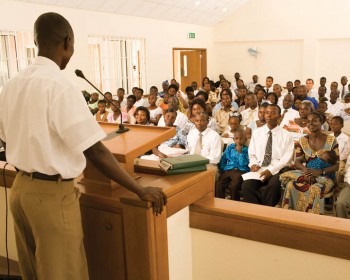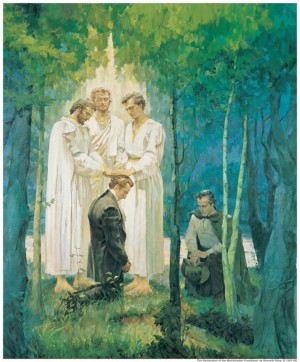Mormons, or members of The Church of Jesus Christ of Latter-day Saints, believe that prophets, or leaders of the Church, are chosen and called of God. Prophets and apostles are called to serve the Lord for the rest of their lives, as were the apostles in Christ’s ancient Church. A prophet’s resignation is always possible, because Mormons believe in the divine gift of choice. A more accurate question is: Would a Mormon prophet ever resign?
The first thought that comes to me is the story of the ancient prophet Jonah. Jonah was commanded by God to preach to the Ninevites. Of course, the first things that pop into my head are the bright and cheery songs from the Veggie Tales’ movie. But the reality is a bit more serious. In Jonah 1, God instructs the prophet to go to Nineveh and tell the people to repent or be destroyed. Jonah 1:3 records his response: “But Jonah rose up to flee unto Tarshish from the presence of the Lord.” He bought passage on a boat sailing in the opposite direction of Nineveh. A great storm arose, and the mariners on the ship were scared. They cast lots to see which person was causing this evil, and the lot fell on Jonah. He admitted that he had fled from the Lord. To save themselves, the mariners cast Jonah into the sea. The sea stopped raging, and Jonah was swallowed by a great fish.
While in the belly of the fish, Jonah repented. In Jonah 2:2-4 he said, “I cried by reason of mine affliction unto the Lord, and he heard me; out of the belly of hell cried I, and thou heardest my voice. … I am cast out of thy sight; yet I will look again toward thy holy temple.” Upon Jonah’s sincere repentance, the fish spit him onto dry ground.
What does this have to do with a modern-day prophet? Jonah was a prophet of God. He was in “the belly of hell,” because he knew he had willfully disobeyed his God. Jonah used his divine gift of agency to flee from his responsibilities, but he could not forget them.
 Prophets are called by God to serve His children. He prepares His prophets for their sacred calling, and He chooses them Himself.
Prophets are called by God to serve His children. He prepares His prophets for their sacred calling, and He chooses them Himself.
President Gordon B. Hinckley, then First Counselor in the First Presidency of The Church of Jesus Christ of Latter-day Saints and later the prophet of the Church, said in a 1991 article titled “We Thank Thee, O God, For a Prophet”:
I am profoundly grateful not only for Joseph Smith as the prophet who served as an instrument in the hands of the Almighty in restoring this work, but also for all of those who have followed him. A study of their lives will reveal the manner in which the Lord has chosen them, has refined them, and has molded them to his eternal purposes. Joseph Smith declared on one occasion: ‘I am like a huge, rough stone rolling down from a high mountain; … knocking off a corner here and a corner there. Thus I will become a smooth and polished shaft in the quiver of the Almighty.’ (Teachings of the Prophet Joseph Smith, sel. Joseph Fielding Smith, Salt Lake City: Deseret Book Co., 1938, p. 304.)
It has been so with those who have succeeded him. Through long years of dedicated service, they have been refined and winnowed and chastened and molded for the purposes of the Almighty. Could anyone doubt this after reading of the lives of such men as Brigham Young, Wilford Woodruff, and Joseph F. Smith? The Lord subdued their hearts and refined their natures to prepare them for the great and sacred responsibility later thrust upon them.
The way the Church of Jesus Christ is organized means, also, that a prophet need not resign from his calling, even if his health is failing. God gives “keys” of the priesthood to His prophets for them to oversee the Kingdom of God on earth. The twelve apostles, both anciently and in the Church of Jesus Christ today, also hold these keys, and they are able to use them in administering the affairs of the kingdom if and when a prophet is incapacitated. This has happened several times in the history of the LDS Church.
Amos 3:7 says, “Surely the Lord God will do nothing, but He revealeth his secret unto his servants the prophets.”
Doctrine and Covenants (another book of scripture in the LDS faith) 1:38 reads:
What I the Lord have spoken, I have spoken, and I excuse not myself; and though the heavens and the earth pass away, my word shall not pass away, but shall all be fulfilled, whether by mine own voice or the voice of my servants, it is the same.
A prophet cannot know the will of the Lord unless and until the Lord tells him. Communication is vital in this relationship, as is trust. A prophet has perfect confidence in the Lord, and the Lord has confidence in His servant, the prophet. After all, the Lord prepared him to be equal to the task. In John 15:15-16 the Lord says, “Henceforth I call you not servants…but I have called you friends.… Ye have not chosen me, but I have chosen you, and ordained you.”
Yes, it is always possible for a prophet to resign his call. A prophet has the ability to choose. But the Lord won’t choose a prophet He can’t trust to fulfill his responsibilities.
This article was written by Lisa Montague, a member of The Church of Jesus Christ of Latter-day Saints.
https://www.youtube.com/watch?v=NTs-7OWT6gI&feature=youtu.be
About Lisa M.
I am a wife and mother of 4 beautiful children in a small town in the mountains of Idaho. We ski as a family in the winter and camp, fish, and go to the beach in the summer. I’m a lifelong member of The Church of Jesus Christ of Latter-day Saints, and I am grateful for the Savior and the blessings of the gospel in my life.



